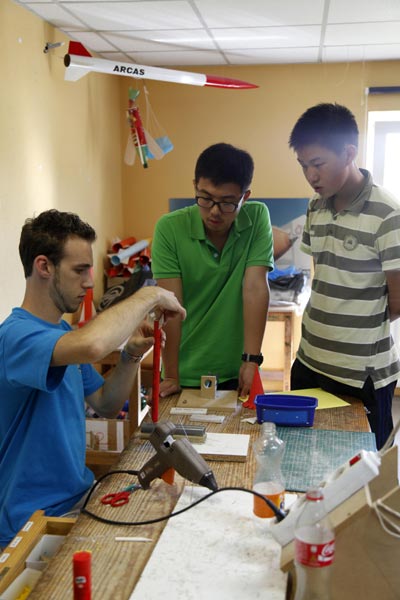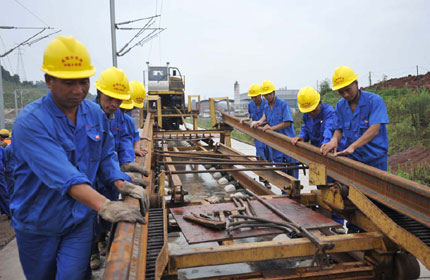Happy campers
Updated: 2014-06-25 07:31
By Liu Zhihua (China Daily)
|
|||||||||||
 |
|
Chinese students observe the making of a rocket model while visiting the Euro Space Center in Belgium during a summer camp in August, 2013. Wang Xiaojun / Xinhua |
 |
| Overseas study attractive at earlier age |
That summer, she paid about 40,000 yuan ($6,400) for her 13-year-old daughter Jingjing to go to a summer camp in New York.
During the three-week program, Jingjing not only attended English classes with dozens of foreign students, but also visited the White House and many other places of interest.
She took in-depth tours to famous universities in the city and nearby, including Columbia University, one of the schools Zhang hopes her daughter might attend in the future.
"The summer camp boosted her academic performance, but most importantly, it exposed her to a different culture and opened a door for her to a broader world," Zhang says.
The experience also helped Jingjing psychologically prepare to lead a life among foreigners, important because her parents hope Jingjing will go abroad to study after graduating from high school, Zhang adds.
She was so pleased with the effect of the camp that in 2013, Zhang paid almost the same amount of money for Jingjing to enjoy a similar camp program in the English city of Cambridge.
Many Chinese parents are enthusiastic about enrolling their children in such costly but view-broadening programs.
"The demand for overseas summer camps from Chinese families is huge and is increasing exponentially," says Louisa Tao, a market manager with EF Education First, a company that works on cultural exchange and study programs abroad.
Since entering the Chinese market in 1993, the Switzerland-based EF Education First has organized overseas study trips and summer camps for about 100,000 Chinese students, Tao says.
The dynamics behind the growing popularity of such service is complicated, but the main driving force, Tao believes, is that parents are willing to pay more so their children can gain overseas experience, especially when more and more Chinese prefer foreign universities to domestic ones.
Such parents are likely to be aged 35 to 40 and well educated; some have overseas work or education experience. While they expect a lot from the academic portion of overseas summer camps, the cultural experience is at least as important—maybe more, Tao adds.
Wu Jiang, a mother of two girls in Shanghai, recently started a business in organizing trips for Chinese children at summer camps abroad.
The inspiration came from her own experience. She and her husband are world travelers, and even though their daughters are now only 2 and 6 years old, they have taken the girls to dozens of countries.
In Wu's eyes, nothing is more educational than exposing the children to cultures and lifestyles of different people—to help them understand the world better.
"Only in such ways, will they grow into knowledgeable, tolerant, loving and confident people who know enjoying life is far better than pursuing money or worldly benefits," Wu says.
Related Stories
Tibetan students receive education on World Environment Day 2014-06-09 16:03
College entrance exams around the world 2014-06-05 07:01
Homework makes children fat 2014-06-03 14:47
American kids enjoy early Chinese learning 2014-06-03 07:12
Examples of bad parenting skills 2014-06-01 08:30
Today's Top News
China, Germany join hands to drive growth
Meet foreigner breed of workers
Product placement deal backfires
From Westlife to the East
Gambling costs World Cup fans their lives
US supports Ukraine's decision to suspend ceasefire
It's all about making a spectacle
China likely to see 7.5% growth in second quarter
Hot Topics
Lunar probe , China growth forecasts, Emission rules get tougher, China seen through 'colored lens', International board,
Editor's Picks

|

|

|

|

|

|





